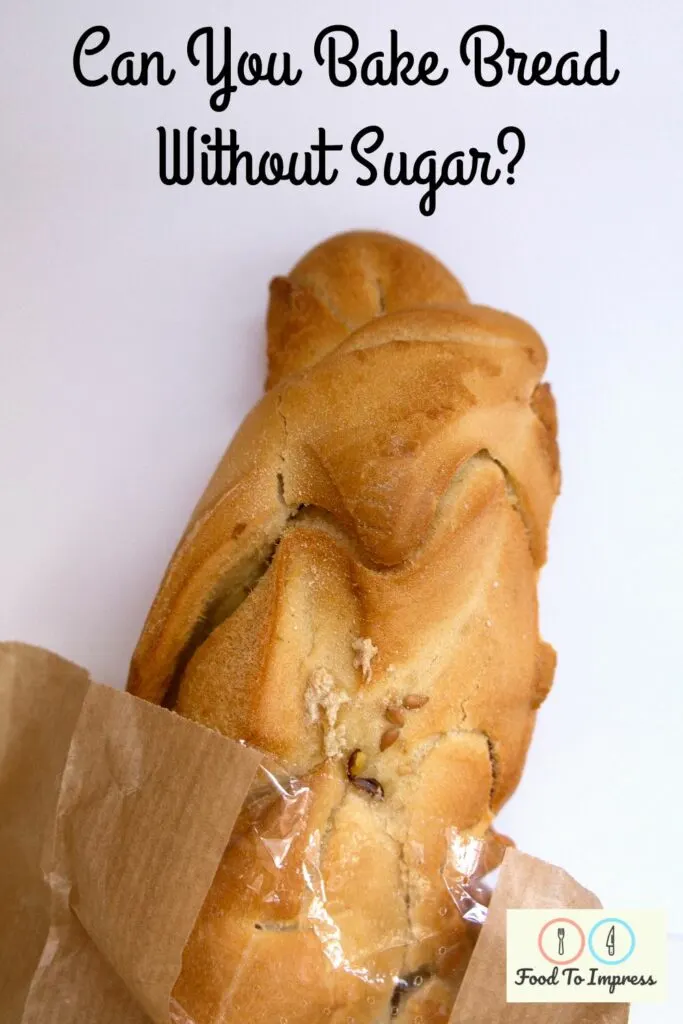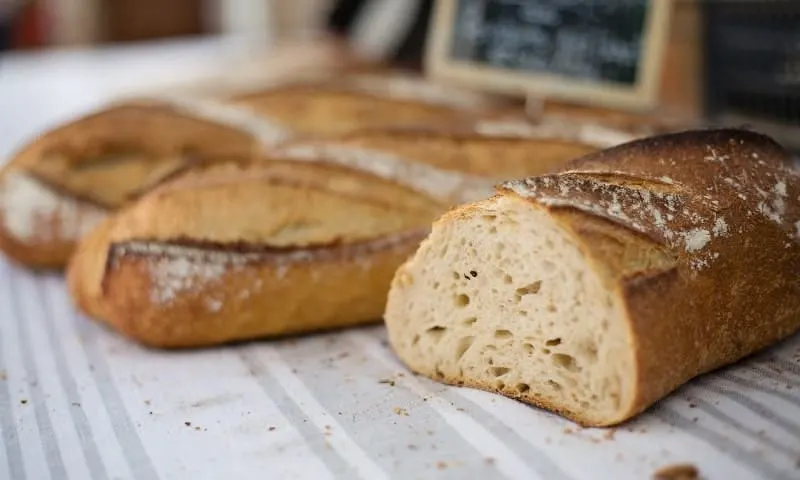It shouldn’t be a surprise to anyone that sugar isn’t good for you. There are so many issues associated with it, but it’s still added to many foods, including bread. Your typical store-bought bread will likely have some added sugar to it, but quality bakery-made bread should have no added sugar.
Although bread isn’t exactly ‘healthy’ as it is, some bread, such as sourdough, is considerably better for you than factory-made bread due to it being easier to digest and of higher nutritional value.
With so many bread recipes out there, it’s difficult to know the correct way to make bread. A lot of recipes call for sugar to be added. This is very common, so most people don’t question it, but is it really necessary to add it?
I’ll be addressing this topic in this article and discussing the benefits and drawbacks to adding sugar to bread dough.
Bread can be made without adding any sugar to the recipe. Yeast does need sugar in order to produce gas, but there’s enough naturally occurring sugar and starches in flour for it to produce gas and raise bread dough effectively.
The main components of bread are flour, water, salt, and yeast, and this is for good reason. These four simple ingredients alone can make great tasting bread, but only if you know how to use them properly.
The majority of bread recipes you find are very basic and made for beginners/amateur bakers. This addition of sugar is to just help speed up the process and in turn, make everything easier for the inexperienced baker.
Now, don’t think that all bread recipes don’t need sugar. Some bread has sugar to add sweetness rather than to just speed up the rise.
Is Sugar Required To Make Good Bread?
Yeast needs sugar in order to produce gas to raise the bread, but it doesn’t need to get it from anything other than the flour you use to make the dough.
It’s very good at breaking down the sugar molecules in the flour, so it’s fine to do its job without the assistance of added sugar.
Additional sugar isn’t required when making bread since there is natural sugar in the flour. Most traditional bread didn’t use sugar because it’s not necessary. You’ll get better results in most bread recipes by cutting out the sugar and allowing for longer rising times.
Sugar can be useful if you’re interested in speeding up the bread-making process, but bread that’s made faster just doesn’t have the same complex flavor as bread that’s had a long rise.

Why Is Sugar Added To Bread?
Many people believe that sugar needs to be added to bread in order for it to rise, which isn’t actually the case.
In the world we live in, most people want results as quickly as possible, so they’ll do what they can to make bread as fast as possible.
By adding sugar, the yeast has more food to consume and has an easier time producing gas, which leads to the bread rising faster and therefore being ready to bake in a fraction of the time.
This faster rising time is very attractive to many people and it’s therefore used in plenty of basic bread recipes.
Another reason why sugar is added is to increase the browning of the bread. Since the dough will contain more sugar, it will be able to caramelize faster and leave you with a lovely crust in a shorter period of time. The problem with this is that it may burn if you’re using a heat that’s too high or baking for too long.
With that said, many people don’t really know why they’re adding sugar to their bread, but they think it’s just a normal thing to do since most recipes call for it and they get tasty bread.
The final reason is because the recipe is for sweet bread and you can’t have sweet bread without some sort of sweetener.
Benefits And Drawbacks To Adding Sugar To Bread
Sugar can be a great addition to bread for some people whilst not being so great for others. It has its uses, but it’s not needed in most cases since it’s not going to add much to the bread.
Here are some of the benefits and drawbacks to adding sugar to your bread dough, so take a look through and decide whether you want to use it or not.
Benefits of Baking Bread without Sugar
The Dough Rises Faster
Plenty of home bakers want their dough to rise faster, so they don’t have to wait for too long, and they can have bread in a very short period of time.
Since yeast feeds on sugar to produce carbon dioxide, adding more sugar makes it easier for the yeast to feed and can therefore produce the gas faster.
Keep in mind that like anything, too much of a good thing can cause problems. By adding too much sugar, it will steal water from the yeast cells and cause them to die, so be careful.
The Crust Will Brown Nicely
If you’re wanting your bread to brown faster, adding sugar is one way to do it.
Bread crust browns due to the high heat causing the sugars to caramelize. When you add more sugar to the bread, the amount of caramelization can increase, and the crust, therefore, browns much faster.
This can be useful to improve browning on small loaves of bread or buns if they don’t bake for very long.
Of course, there are other methods to increase browning, such as using a wash or glaze, but this is just one option.
It Helps Keep The Bread Fresh For Longer
Bread loses freshness as it loses its moisture. French bread is made in the simplest way possible with only flour, water, salt, and yeast, but it can go stale very quickly. This is why it’s very common to buy French bread daily.
Sugar holds onto moisture reasonably well, so when it’s added to bread, the bread will retain this moisture for a longer period of time and therefore last longer before going stale.
This all depends on how much sugar is added to the dough of course, but even a small amount may make a difference. It’s up to you to decide whether it’s worth it or not.
Drawbacks of Baking Bread without Sugar
You Lose Out On Flavor
Adding sugar to bread might allow you to make it faster, but you’re sacrificing a better flavor.
One thing that’s great about bread that doesn’t have added sugar is its complex flavor. A longer rise allows the yeast to do more work and develop more flavor, which is great, especially when it has had a long cold rise over a day or so
You can definitely notice a flavor difference between bread that’s had a short rise and bread that’s had a long rise.
It’s More Unhealthy
There’s no doubt about it that sugar isn’t great for your health, so adding it to your bread will only make it more unhealthy
Most bread isn’t very good for you as it is and it’s very easy to add additional ingredients that make it worse.
If you’re at all bothered about your dental health or overall wellbeing, you might want to avoid adding any to your dough next time
If it’s just on occassional treat for yourself, I’m sure a little bit of sugar won’t do much harm.
It’s More Likely To Burn
Since sugar increasing the caramelization in the crust, it can actually lead to overbrowning and burning.
If you’re using a heat that’s too high or baking your bread for too long, the chances of it burning are much higher and you might struggle to prevent the burning during baking.
If you’re making bread that uses high heat and/or bakes for a long time, it’s a good idea to skip the sugar and keep the ingredients simple. For example, adding sugar to baguette or Neapolitan pizza dough (which uses high heat) causes the bread to easily burn.
Need Ideas?
Try this banana bread recipe without sugar for a quick bread to get you started on a healthier eating path.

